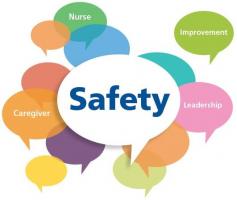Up to 98,000 patients die each year due to hospital medical errors according to the Institute of Medicine. And medical facilities and leaders across the country have been working for years to reduce controllable patient deaths and improve patient safety.
 With patient safety being the central foundation of any health care system, promoting a culture of safety is critical in making a significant difference. Bradi Granger, PhD, MSN, RN, FAAN, associate professor for Duke University School of Nursing (DUSON), is coordinating the Patient Safety Institute: Promoting a Culture of Safety at DUSON on September 26 and 27, 2016, that will introduce patient safety concepts and methods that help promote and improve a culture of safety.
With patient safety being the central foundation of any health care system, promoting a culture of safety is critical in making a significant difference. Bradi Granger, PhD, MSN, RN, FAAN, associate professor for Duke University School of Nursing (DUSON), is coordinating the Patient Safety Institute: Promoting a Culture of Safety at DUSON on September 26 and 27, 2016, that will introduce patient safety concepts and methods that help promote and improve a culture of safety.
“Over the years, experts have been able to identify a gap between the development of concepts for patient safety and the application of the concepts,” said Granger. “This shows that we need to work on changing the culture within health systems that will engage all levels within care delivery to become more patient safety conscious.”
The conference will feature three speakers with more than 50 combined years of patient safety experience.
|
Judy Milne, MSN, RN, CPHQ, CPPS, is the patient safety officer for Duke University Hospital in Durham, N.C. In her role at Duke, Milne is responsible for administering and facilitating the ongoing patient safety program and initiatives that foster safe patient care. She has participated in the development of patient safety policies, methods and responses for nearly 20 years as the regulatory and accreditation systems in the United States have advanced the focus on patient safety. |
|
René Schwendimann, PhD, RN, is the chief patient safety officer for University Hospital in Basel, Switzerland. In his role at the 750-bed hospital, Schwendimann is responsible for leading patient safety programs such as adverse event detection and learning form medical errors using root cause analyses or learning from defects. He has more than 30 years of professional experience in the clinical, administrative and teaching arenas. His research includes patient falls prevention, nurse workforce issues and patient safety culture.
|
|
Bryan J. Sexton, PhD, is the director of the Duke Patient Safety Center for Duke University Health System in Durham, N.C. With specializations in organizational assessment, teamwork, survey development and quantitative methods, Sexton spends his time teaching, mentoring, conducting research and finding practical ways of getting busy caregivers to do the right thing by making it the easy thing to do. He has captured the wisdom of frontline caregivers through rigorous assessments of safety culture, teamwork and workforce resilience, and his research instruments have been used around the world in more than 3,000 hospitals in 30 countries. |
In addition to the in-person lectures, participants will take part in two pre- and post-course webinars. The pre-course webinar is designed to allow participants to identify an urgent or important safety issue in their own clinical practice setting and submit that scenario for the conference. The post-course webinar will serve as a debrief of the course content and a follow-up on participant scenarios.
“The scenarios that are submitted during the pre-course webinar will be discussed during day one of the conference,” Granger said. “During the entire conference participants will receive information, advice and tools that will provide them with a broad base of knowledge. We want participants to leave with confidence in implementing the changes they learn during the conference.”
 Granger also shared that the post-course webinar, which will be a month after the conference, will allow participants to share updates on their work. “The post-course webinar will include a recap of the course content as well as time for participants to debrief on their action items and share any problems they’re facing in applying the strategies they learned during the conference. It will also be a time for them to determine and develop an alternate plan if need be.”
Granger also shared that the post-course webinar, which will be a month after the conference, will allow participants to share updates on their work. “The post-course webinar will include a recap of the course content as well as time for participants to debrief on their action items and share any problems they’re facing in applying the strategies they learned during the conference. It will also be a time for them to determine and develop an alternate plan if need be.”
The conference is open to patient-care practitioners, registered nurses, nurse practitioners, patient safety, quality and risk professionals, hospital executives and board members and patient advocates. “Change in culture is a huge undertaking; therefore, it requires engagement from all levels within care delivery,” said Granger. “Developing a culture of safety consciousness requires change in workflow among other things; therefore, culture starts at the ground level.”